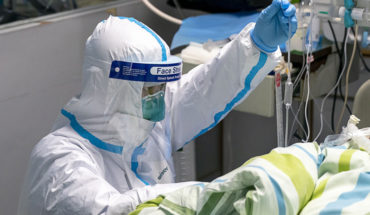
“Paranoia and fear are not, nor will they be the way. We’re going to come out together by putting it side by side,” says one singer-songwriter. This simple and in-depth message was conveyed to us by the Uruguayan musician and doctor Jorge Drexler, after having cancelled a concert in Costa Rica, following the measures taken by the authorities to control the impact of the now declared pandemic caused by the Convid-19.
The word pandemic is by nature a generator of fear, stress and concern. That is why a pandemic statement is always an extreme measure, taken when the risk of global contagion takes on a threatening and difficult to control speed. That’s what happened, and the numbers prove it.
WHO had not declared a pandemic in 11 years. The last was 2009 with H1N1 influenza. Globalization and the mobility of the world’s population makes it easier to transmit a virus across the virus.
The coronavirus began in The China province of Wuhan a couple of months ago and today there are 140 countries that are suffering the consequences of this new virus. China reports that thanks to the extreme and urgent measures it took, it has managed to control its expansion. South Korea, according to international experts, has given the best response: more than 80% of contaminated people have recovered. Italy is suffering the consequences of a tene reaction, which did not assess risk and where the relaxed population did not give it the importance it deserved. This is shown by hundreds of testimonies that today make a mea culpa with this lack of responsibility.
While for some the Nordic countries seem to be taking the necessary precautions, for others the reactions have been late. Alternative voices rise calling for more radical measures, such as total isolation, just as China did.
For example, yesterday the newspaper El País raises the following disjunction: the contagion figures we know have a direct relationship with the number of tests applied and when they are carried out. “To judge the data of confirmed cases it is important to know how much effort each country is making to detect all infections. The differences are great: Korea has done 3,400 tests for every million inhabitants, Italy or Switzerland have done between 500 and 600 and the United States had made just 2 per million when it stopped publishing its data a few days ago,” the newspaper says.
“Countries’ detection capabilities affect their lethality rates. It doesn’t seem coincidental that Korea, which is the country that has done the most tests, has the lowest death rate. It is reasonable to think that if countries do more tests—and detect more mild cases—their lethality figures will approach those in the Asian country.”
In the neighborhood
In Latin America the threat is already real. The figures show how rapidly it evolves. Brazil is until yesterday the country with the most confirmed positive cases. Chile reports 201 cases, while Argentina and Brazil are the only countries in the region that report deaths so far. Most governments are taking different steps to pale the impact, prevent sustained transmission and save lives, especially for the most vulnerable.
The Brazilian doctor and social communicator Drauzio Varella writes, in the folha de Sao Paulo newspaper, that the first community infections have begun to appear in his country, that is, that of Brazilians who acquire the virus without having traveled abroad or having had contact with travelers. This means infections will increase in the coming weeks. Although the rate of spread is slowed down, Varella believes that everything seems to indicate that an epidemic of national proportions is likely to occur, which will cause a “brutal stress” in the Brazilian health system.
Some measures have been taken in Chile to respond to the progress of the epidemic. The suspension of classes, the prohibition of events that bring together more than 50 people or the closure of the borders, are some of the recent measures taken. We’re in stage four. It’s time to strengthen emergency health teams and install new capabilities to be better prepared for the increase in patients who will require intensive care.
We are fortunate to live in a country that, despite its weaknesses and inequity in many areas, has systems and structures that can respond to this threat.
Responsibility v/s crisis
There are several nations in the world that unfortunately, as a result of the crises affecting them, are in precarious or helpless conditions to deal with this pandemic. The International Committee of the Red Cross has pointed this out in a troubling statement indicating that war zones, conflict or refugee camps are left in total homelessness. UN Secretary-General Antonio Guterrez called for international solidarity, emphasizing that cooperation and mobilization of all countries will be the only thing that can stop this threat.
However, all the measures that are taken, hopefully in a timely manner, will be useful to minimize the impact of this global threat, but the most important thing will be how citizens are able to react and behave. The most difficult thing is to control the individual perception of risk and to make the population understand the urgency of ensuring risk control for society.
We know that in times of crisis human beings can show their best and worst qualities. The success of the measures taken will depend on our ability to accept and implement them. This pandemic tests our discipline, our social responsibility and above all our capacity to be supportive. If we cannot behave that way, “if we are not able to live entirely as people – as Saramago said in his brilliant book Essay on Blindness – let’s at least do everything we can not to behave like animals.”
Being responsible, being supportive, being a person, means complying with the recommended self-protection measures. Most of these measures are simple and range from rigorous hand washing to temporary self-isolation.
Being supportive and responsible also means not circulating speculative or doubtful information. We must remember that concern pollutes faster than a virus. Evidence and knowledge must be based, not on populist speculation or information based on “alternative facts”.
You don’t have to run hysterically to a medical emergency center because we think we have symptoms that actually correspond to a simple cold. My presence there exposes me to being contaminated. It also overloads a health system that must be prepared to serve the neediest and vulnerable. Preventing health systems from collapsing is critical, as is doing everything possible to keep the commodity supply chain from going into oversupply. All this is to be responsible for the functioning of society.
This health crisis tests our values and gives us an opportunity to show that solidarity is more powerful than individualism and selfishness, both frequent pollutants of our existence in recent decades.
“From this – as the singer-songwriter Drexler puts it – we will come out together putting it side by side.”
The content poured into this opinion column is the sole responsibility of its author, and does not necessarily reflect the editorial line or position of El Mostrador.





